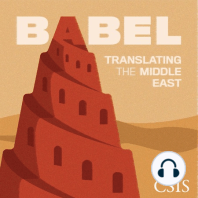27 min listen

Jason Rezaian: What We Get Wrong About Iran
Jason Rezaian: What We Get Wrong About Iran
ratings:
Length:
38 minutes
Released:
Feb 1, 2022
Format:
Podcast episode
Description
This week on Babel, Jon speaks with Jason Rezaian, an Iranian-American journalist who grew up in California and moved to Iran to report in 2009. In 2012, he joined the Washington Post, and in 2014, he was arrested and spent 544 days in Iran's Evin Prison. Jon and Rezaian talk about why he went to Iran, what the U.S. government gets wrong about Iranians, and how Iranian leaders think about hostage-taking and its role in Iranian foreign policy. Then, Jon, Will Todman, and Caleb Harper continue the conversation about what some Iranians get wrong about Americans and how decisionmakers should think about public opinion in Iran and other states in the region.
Jason Rezaian, “Iran is spinning a fairytale that there’s no place like home. No one’s buying it.” Washington Post, January 12, 2022.
Jason Rezaian, “Four decades of ignorance have led to this U.S.-Iran standoff,” Washington Post, December 28, 2021.
Podcast, "Karim Sadjadpour: Iran's Future," CSIS, July 13, 2021.
Jon Alterman, "Iran Will Still Be a Slog," DefenseOne, January 23, 2021.
Transcript, "What We Get Wrong About Iran," CSIS, February 1, 2022.
Jason Rezaian, “Iran is spinning a fairytale that there’s no place like home. No one’s buying it.” Washington Post, January 12, 2022.
Jason Rezaian, “Four decades of ignorance have led to this U.S.-Iran standoff,” Washington Post, December 28, 2021.
Podcast, "Karim Sadjadpour: Iran's Future," CSIS, July 13, 2021.
Jon Alterman, "Iran Will Still Be a Slog," DefenseOne, January 23, 2021.
Transcript, "What We Get Wrong About Iran," CSIS, February 1, 2022.
Released:
Feb 1, 2022
Format:
Podcast episode
Titles in the series (100)
Jihadi Poetry in Yemen: This week, Jon, Will, and McKinley talk about who joins militant jihadi groups and why. Then, Jon talks with Elisabeth Kendall, an Oxford University-based scholar of Arabic literature who has focused on poetry among Yemeni jihadis. by Babel: Translating the Middle East